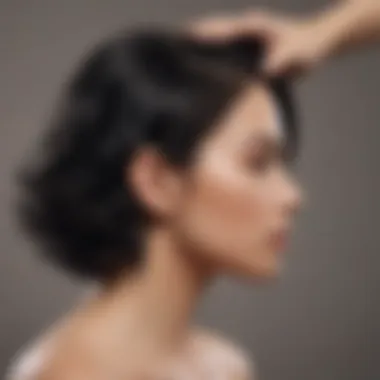The Best Shampoo for Black Hair: An In-Depth Guide


Intro
When choosing shampoo for Black hair, it's essential to recognize the unique characteristics that set it apart from other hair types. Black hair often has a coarser texture and a tendency to be more dry and prone to breakage. This guide aims to provide insight into selecting the right shampoo that meets these specific needs while also addressing common hair concerns.
With the market flooded with options, readers need the knowledge to make informed decisions. Key factors include ingredients, texture compatibility, and intended use. Understanding what works best for Black hair can enhance its natural beauty and health.
This article will explore various topics related to hair care, providing recommendations for shampoos designed specifically for Black hair. Additionally, it will offer guidance on hair maintenance practices, ensuring readers not only select suitable products but also incorporate effective routines.
Understanding Black Hair
Black hair has distinct features that require special attention. The natural curl pattern can make it challenging for sebum to travel down the hair shaft, leading to dryness. Moreover, styling preferences such as braids or twists can affect how products are absorbed and utilized.
To care for Black hair properly, it's crucial to choose shampoos that harness moisture without stripping essential oils. Ingredients such as natural oils, butters, and gentle cleansers are preferable. Understanding these needs helps create a foundation for effective hair care.
Shampoo Essentials for Black Hair
Key Ingredients
Different ingredients serve specific purposes in hair care. Here are some critical components to look for:
- Moisturizing Agents: Look for shea butter, coconut oil, and glycerin.
- Proteins: Hydrolyzed silk and keratin can help strengthen the hair.
- Detanglers: Essential for managing knots and preventing breakage.
Avoid harsh sulfates that can dry out the hair, stripping it of vital moisture.
Product Categories
Choosing the right category of shampoo is equally important:
- Clarifying Shampoos: Used periodically to remove product buildup.
- Moisturizing Shampoos: Ideal for regular use to maintain hydrating levels.
- Deep-Cleansing Shampoos: Useful for thorough cleansing without over-drying.
Common Hair Concerns
Dryness and Breakage
This is a leading issue for many with Black hair. Regular conditioning and the use of moisturizing shampoos can mitigate these problems. Using leave-in conditioners can also provide extra moisture.
Dandruff
Flaky scalp can affect any hair type. Selecting a shampoo that includes anti-dandruff ingredients, while still being gentle, can make a significant difference. Look for formulas with tea tree oil or zinc pyrithione.
"Education is key when it comes to choosing the right hair products. Knowing your own hair’s needs can lead to better results."
Finale
In summary, understanding the unique needs of Black hair allows for effective product selection. Choosing the right shampoo is just the beginning. With comprehensive knowledge, readers are empowered to make informed choices for healthier hair care. As this article progresses, specific products will be reviewed, highlighting their strengths and suitability for Black hair.
Understanding Black Hair


Understanding Black hair is essential for both the care and styling of this distinct type. Black hair is unique not only in its physical characteristics but also in its cultural significance. This section aims to shed light on the attributes that define Black hair, exploring its various types and textures. A thorough understanding will lead to better hair care choices, which is crucial for maintaining healthy and beautiful hair.
Characteristics of Black Hair
Black hair is known for its density and volume. One of the primary characteristics is its curl pattern, which can range from tightly coiled to looser waves. This distinct structure often means that oils produced by the scalp do not travel as effectively down the hair shaft, leading to dryness. This makes moisture retention a priority for Black hair types. Moreover, Black hair is generally more fragile than other hair types, requiring gentle handling to avoid breakage. Micro-skin cells in Black hair create unique styling possibilities but also necessitate specific care practices.
"The unique structure of Black hair requires specialized care to maintain its health and beauty."
Hair Types and Textures
There are several recognized types and textures of Black hair, commonly categorized using the Andre Walker Hair Typing System. This system includes:
- Type 1: Straight Hair
- Type 2: Wavy Hair
- Type 3: Curly Hair
- Type 4: Kinky/Coily Hair
Understanding where one’s hair fits into this classification can help in selecting the correct shampoo and conditioning products. For instance, Type 4 hair, which is often tightly coiled, benefits significantly from moisturizing shampoos that can prevent dryness and breakage.
Common Myths about Black Hair
There are numerous myths surrounding Black hair that can lead to misconceptions about care routines. Some common myths include:
- Myth 1: Black hair doesn't grow long.
Fact: All hair types can grow long with proper care. Black hair often requires different management techniques for optimal growth and retention. - Myth 2: Washing Black hair too often is bad.
Fact: The frequency of washing depends on the individual's hair type and lifestyle; some may need regular washing to maintain scalp health. - Myth 3: Oil is the best moisturizer for Black hair.
Fact: While oils can help seal moisture, they are not sufficient alone. A good moisturizer should be applied first.
Debunking these myths is vital for anyone looking to achieve the best results in their hair care journey. Understanding one's hair is the first step toward successful management and styling.
Key Factors in Choosing Shampoo
Selecting the right shampoo for Black hair requires a nuanced understanding of its unique needs. The right shampoo can promote healthy growth, improve manageability, and enhance overall appearance. In contrast, an unsuitable choice can lead to various issues, such as dryness, breakage, and scalp irritation. Therefore, discerning the factors that influence this choice is essential for anyone caring for Black hair.
Understanding pH Balance
The pH of a shampoo significantly affects how it interacts with hair. Human hair has a natural pH level that ranges from 4.5 to 5.5. Shampoos with a similar pH help maintain hair’s moisture and minimize damage. A high pH shampoo can cause the hair cuticle to lift, leading to frizz and breakage. When choosing a shampoo, look for products that specify a balanced pH. This can be especially critical in maintaining the integrity of Black hair, which requires careful regulation of moisture levels.
Ingredients to Avoid
Certain ingredients can be particularly harmful to Black hair. Sulfates, which are common cleansing agents, can strip natural oils and moisture from the scalp and hair, leading to dryness. Parabens may disrupt hormonal balance and have been linked to long-term health concerns. Additionally, mineral oil and petrolatum can create buildup, weighing down the hair and making it look dull. It's crucial to read ingredient labels and steer clear of these potential irritants.
Benefits of Natural Ingredients
Natural ingredients can offer numerous benefits for Black hair. Ingredients such as shea butter, coconut oil, and aloe vera provide moisture and nourishment, enhancing softness and shine. Shea butter is known for its deep conditioning properties, making it ideal for dry or brittle hair. Coconut oil helps in penetration, allowing moisture to stay locked within the hair structure. These natural ingredients tend to work synergistically to improve hair health and manageability, making them a preferred choice for many.
Moisturizing vs. Clarifying Shampoos
Understanding the difference between moisturizing and clarifying shampoos is vital when caring for Black hair. Moisturizing shampoos are designed to add hydration and are often richer in nourishing ingredients. They are useful for maintaining moisture levels, especially for dry or curly hair.
On the other hand, clarifying shampoos serve a different purpose. They are formulated to remove buildup from styling products, oils, and environmental factors. While they are essential from time to time, they can strip away moisture if used too frequently. Therefore, a balanced routine should ideally incorporate both types, depending on individual hair needs and concerns.
Remember: Use clarifying shampoos sparingly to avoid overdrying your hair.
Top Shampoo Recommendations
Choosing the right shampoo is crucial for maintaining the health and appearance of Black hair. The variety of available shampoos can be overwhelming, making it essential to focus on specific types and their benefits. This section provides a curated list of recommended shampoos, highlighting their unique qualities that cater to the diverse needs of Black hair. By understanding which products offer the best ingredients and formulations, individuals can make informed decisions that enhance their hair care routines.


Natural and Organic Shampoos
Natural and organic shampoos are becoming increasingly popular among those with Black hair. These shampoos often contain fewer synthetic chemicals and rely on plant-based ingredients, which can be gentler on the hair and scalp. They help to avoid potential irritants found in traditional shampoos. Ingredients like aloe vera, coconut oil, and shea butter nourish the hair while also promoting moisture retention.
Benefits of using natural and organic shampoos:
- Reduced chemical exposure: Less risk of irritation or allergic reactions.
- Sustainable practices: Often, these brands focus on eco-friendly production methods.
- Enhanced hydration: Natural oils and extracts can combat dryness and brittleness commonly experienced with Black hair.
Sulfate-Free Shampoos
Sulfate-free shampoos are a crucial choice for maintaining the integrity of Black hair. Sulfates, such as sodium lauryl sulfate or ammonium lauryl sulfate, are foaming agents that can strip natural oils from hair. This creates a challenge for those with textured hair who require moisture for manageability. Sulfate-free options develop a milder lather while still effectively cleansing the hair.
Considerations for sulfate-free shampoos:
- Gentle cleansing: Helps maintain moisture balance.
- Enhanced definition: Often improves curl pattern retention, leading to a more defined look.
Hydrating Shampoos
Hydrating shampoos typically contain ingredients that help restore moisture and improve overall hair health. They are formulated to penetrate the hair shaft, delivering optimal hydration and reducing breakage. Many hydrating shampoos contain oils, humectants, and natural extracts that work effectively for Black hair.
Key features of hydrating shampoos:
- Moisture boost: Can significantly help combat dryness.
- Softened texture: Leads to smoother and more manageable hair.
Shampoos for Natural Hair
For those who embrace their natural texture, specific shampoos are designed to cater to this need. These shampoos often emphasize moisture retention and curl enhancement. Ingredients like jojoba oil and honey are commonly included, promoting softness and hydration.
Important aspects of shampoos for natural hair:
- Curl-friendly formulations: Help maintain the natural curl pattern.
- Frizz control: Often designed to minimize frizz and promote shine without heavy greasiness.
Shampoos for Relaxed Hair
Relaxed hair requires special consideration due to its altered texture. Shampoos formulated for relaxed hair are designed to provide extra nourishment and hydration. These products often feature repairing ingredients to help reduce damage from chemical processes.
Focus areas for shampoos for relaxed hair:
- Repairing properties: Ingredients such as keratin help in strengthening hair.
- Moisture-rich formulas: Essential to prevent further dryness and breakage.
By selecting shampoos that align with individual hair needs, users can promote better manageability and overall hair health.
Addressing Common Hair Concerns
When it comes to maintaining Black hair, addressing common concerns is critical for achieving healthy strands and a flourishing scalp. Black hair is often susceptible to various issues due to its unique structure and texture. This section highlights essential elements of hair care that everyone should embrace to ensure their hair remains in optimal condition. Understanding and addressing these concerns can lead to more informed decisions when selecting shampoos and other hair care products.
Dryness and Brittleness


Dryness is a prevalent issue for Black hair. This hair type lacks moisture due to its structure, which can prevent natural oils from traveling down the hair shaft. Consequently, the cuticles become rough, causing hair to feel brittle and more prone to breakage. To combat this, regular use of moisturising shampoos is recommended. These shampoos should contain ingredients like shea butter, glycerin, or aloe vera, which help to hydrate and nourish the hair. Techniques such as oiling the hair and hydrating it regularly can further mitigate dryness.
Scalp Health
A healthy scalp translates to healthy hair growth. Black hair often experiences scalp issues such as dryness and itchiness, leading to discomfort and potential hair loss. Keeping the scalp clean and balanced is essential. Shampoos that focus on maintaining the scalp's natural oils are ideal. Ingredients such as tea tree oil or peppermint oil can soothe irritation and encourage better blood circulation. Exfoliating the scalp occasionally can also help remove buildup.
Dandruff Solutions
Dandruff is another challenge many face. It can arise from dry skin, product buildup, or even fungal infections. For effective treatment, you should consider shampoos that contain anti-fungal components like zinc pyrithione or selenium sulfide. These ingredients work to eradicate dandruff and maintain the scalp's health. When used consistently, these types of shampoos can also reduce flaking and improve overall scalp condition.
Shrinkage and Elasticity
Shrinkage is a natural phenomenon in Black hair, often seen as a sign of healthy curls. However, excessive shrinkage can hinder styling options. Elasticity refers to the hair's ability to stretch without breaking. To enhance elasticity, it is advisable to use shampoos with protein-rich formulations. Proteins such as keratin can strengthen the hair. Regular conditioning and deep conditioning treatments also play a vital role in maintaining elasticity. Alongside the right shampoo, implementing a consistent hair care routine will contribute significantly to managing shrinkage and improving the hair's overall health.
Maintaining Healthy Hair
Maintaining healthy hair is critical for anyone but carries particular significance for those with Black hair. This hair type tends to be drier and more prone to breakage due to its unique structure. Proper hair care not only promotes growth but also enhances the overall appearance. Factors such as hydration, nourishment, and protection are essential in the upkeep of Black hair. Thus, adopting a suitable hair care regimen is paramount for achieving lustrous and resilient locks.
Importance of Regular Washing
Regular washing is a fundamental aspect of hair care, yet the frequency must suit individual needs. For Black hair, which often produces less natural oil, washing can be less frequent compared to other hair types. The right shampoo helps remove dirt, build-up, and products without stripping essential moisture.
Consider using a gentle, sulfate-free shampoo that cleanses while maintaining your scalp's natural oils. This practice not only keeps your hair clean but also prevents scalp issues like dryness or dandruff.
Conditioning and Deep Conditioning
Conditioning is not just a step, but a vital part of maintaining hair health. Conditioners seal moisture and provide slip, making hair easier to manage.
- Deep conditioning treatments play a pivotal role in rejuvenating the hair. These products penetrate deeper than regular conditioners, offering intense hydration and nourishment. Regular deep conditioning is beneficial, especially after chemical treatments or during seasonal changes.
Balancing your routine between regular conditioning and occasional deep treatments ensures your hair remains supple and less prone to breakage.
The Role of Protective Styles
Protective styles are particularly important for Black hair. These styles safeguard hair ends, which are the most vulnerable to damage. By minimizing exposure to environmental stressors, such as heat and humidity, protective styles help maintain length and health.
Some common protective styles include:
- Braids
- Twists
- Buns
- Wigs
Each style serves the purpose of reducing manipulative wear and tear. However, it is also essential to rotate through styles to avoid tension on the scalp and hair. Awareness of how to safely implement these styles can lead to long-term hair health.
Regular maintenance and careful styling choices can dramatically improve hair resilience and health. Understanding your specific hair needs is key to making informed decisions.
Culmination
In summary, making informed choices about shampoo for Black hair is essential. The right shampoo not only cleanses, but promotes overall hair health. Each person’s hair needs vary significantly, depending on type, texture, and specific concerns like dryness or brittleness. Therefore, understanding these unique aspects is crucial.
Choosing a shampoo formulated specifically for Black hair can lead to better moisture retention and reduced breakage. Acknowledging the differences in hair types can help consumers select products that are not just appealing but functional. This guide serves as a resource for those looking to navigate the often complex world of hair care. After reading this article, individuals should recognize the nuances in their hair’s needs and feel empowered to decide what products best suit them.
"Knowledge is power when it comes to hair care."
Additionally, considering factors such as pH balance and ingredient quality can radically change hair health over time. Shampoos with natural ingredients often provide added benefits without the harm that harsh chemicals might cause. Paying attention to how one's hair reacts to different products can inform future choices, ultimately leading to a more personalized hair care routine.
The importance of using the right shampoo cannot be understated. It sets the foundation for maintaining healthy and vibrant hair. Whether one opts for a moisturizing, organic, or sulfate-free alternative, understanding one’s hair is the first step toward achieving optimal results. Striving for healthy hair is a worthwhile pursuit, and it starts with the right shampoo.



